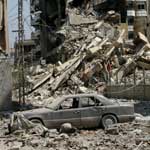 ABC, The Lebanese Government says three weeks of Israeli bombardment has inflicted $US2 billion ($2.6 billion) of damage on Lebanon’s infrastructure. As Australians in Lebanon are urged to get on board what will possibly be the last government-chartered evacuation ship from Beirut, Lebanon’s Transport and Public Works Minister has detailed the damage to infrastructure which has impeded the refugees’ escape.
ABC, The Lebanese Government says three weeks of Israeli bombardment has inflicted $US2 billion ($2.6 billion) of damage on Lebanon’s infrastructure. As Australians in Lebanon are urged to get on board what will possibly be the last government-chartered evacuation ship from Beirut, Lebanon’s Transport and Public Works Minister has detailed the damage to infrastructure which has impeded the refugees’ escape.
Israel launched a bombing campaign and ground incursions into Lebanon after Hezbollah guerrillas captured two Israeli soldiers in a cross-border raid on July 12. The bombardment has cut off many roads, bridges and flyovers in the south and east of the country as well as putting the country’s only international airport and ports out of action. Transport Minister Mohammed al-Safadi says it will take at least three months to bring the airport back up to full capacity. Two runways can be temporarily patched up in days but a third will take three months to fix, hampering the speed of recovery once hostilities end.
A bridge on the main international highway between Beirut and Damascus, the highest in the Middle East, will take around four years to rebuild.
"Between preparations, planning and so on it will take three or four years, easily," he said.
"That is the problem, so as a ministry, we are now focusing … on securing alternative crossings."
Reconstruction aid
Direct income to the government treasury from the airport alone is $US15 million a month, Mr Safadi said, but the biggest cost to the Lebanese economy is from lost business.
Trade and tourism are now both at standstill amid an Israeli air and sea blockade. Land routes, heavily used by trucks carrying goods from Beirut port to Syria and beyond, are hit.
Israel has struck the radars and fuel tanks at the ports, with port buildings in Tripoli and Tyre badly damaged. Beirut port has been spared the worst though it is now idle except for incoming humanitarian aid convoys and outgoing foreign evacuees.
"The biggest economic loss to the country is really for those who used the airport for trade and tourism," he said.
"That is the government’s main income. We are losing the government’s main income."
Lebanon, which borrowed heavily to rebuild after the end of its 1975-1990 civil war, is hoping to attract foreign aid to help with the reconstruction once the 22-day-old conflict ends.
Evacuation
The Federal Government has chartered another ship to evacuate Australians from Beirut today.
The Foreign Affairs Department (DFAT) says the ship is due to leave the Beirut port this afternoon, bound for Cyprus.
DFAT is urging Australians wanting to leave to register with the embassy, as it says there are no further evacuation voyages planned.
Hezbollah guerrillas fired at least 182 rockets into Israel on Wednesday, the highest one-day total since the conflict began three weeks ago, Israeli police said.
The Lebanese guerrilla group has fired more than 1,700 rockets at Israel since the conflict began on July 12, killing 19 civilians and wounding hundreds.
One civilian, a 52-year-old man, was killed in a barrage on Wednesday.
Funerals delayed
The funerals for victims of Israel’s bombing attack on the village of Qana have been postponed because of continuing Israel air raids.
The bodies of 95 people, including those of 52 victims of the attack on Qana which caused outrage across the work, are sitting in a refrigerated semi-trailer parked outside a hospital in Tyre.
Cheap plywood coffins are stacked nearby ready for a mass burial.
But the city continues to reverberate with the sounds of Israeli bombing at the entrance to Tyre, close to the Palestinian refugee camp of Burj al-Chemali.
The town council announced the burials in a mass grave would be postponed.
Meanwhile three Lebanese Army soldiers have been killed in an Israeli air attack on a large military base to the east of the southern port city of Sidon.
– ABC/Reuters



